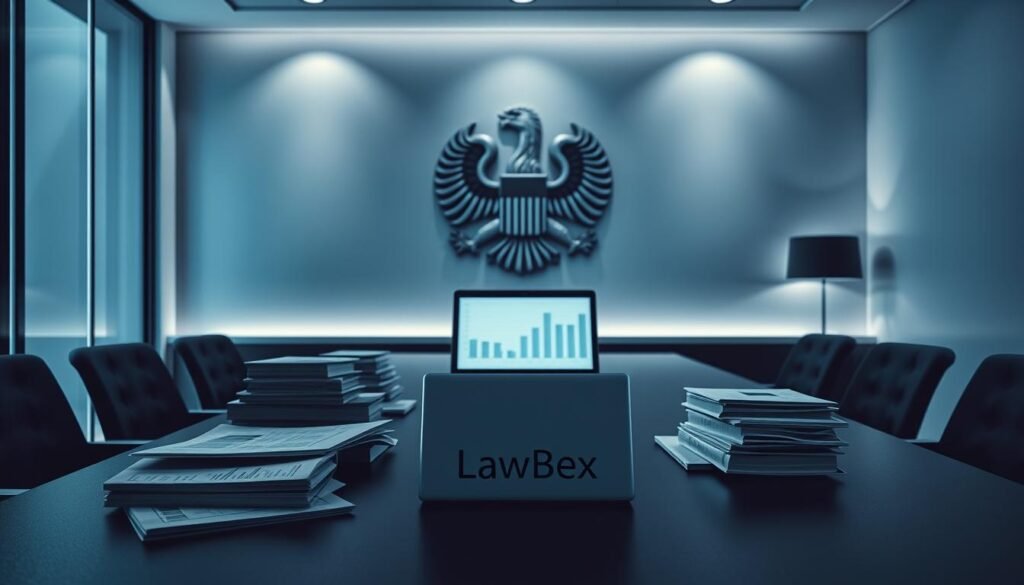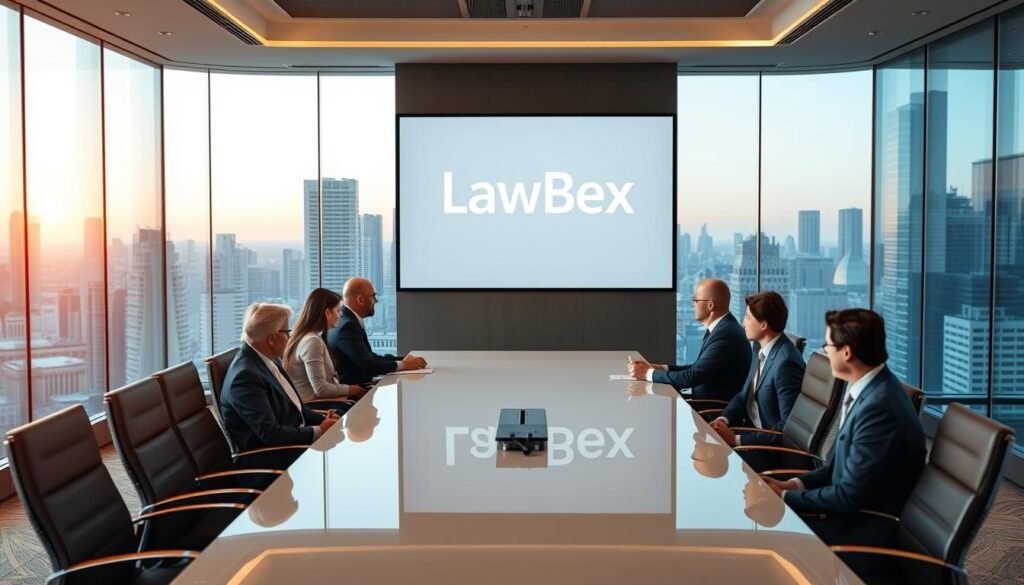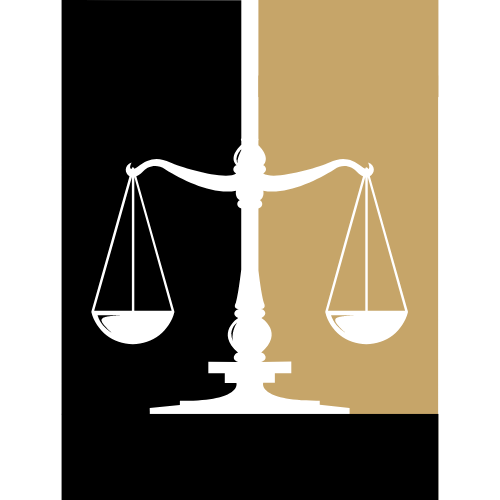In the world of finance and corporate power, a dark side of crime exists. It’s often hidden from the public. We’re looking into white-collar crime and asking: How big is this shadow economy, and what harm does it cause to businesses, people, and society?
This article will explore the complex world of white-collar crime. We’ll look at financial wrongdoings like fraud, embezzlement, insider trading, and money laundering. We’ll reveal the methods, the people involved, and the effects on the business world. Our goal is to help you understand the challenges of dealing with white-collar crime.
Key Takeaways
- White-collar crime includes many financial wrongdoings, like fraud, embezzlement, insider trading, and money laundering.
- These crimes have big effects, hurting businesses, investors, and the economy.
- Knowing about white-collar crime is key for businesses and people to stay safe.
- Fighting white-collar crime needs a team effort, with rules, law enforcement, and good company management.
- Whistleblowers are very important in uncovering white-collar crimes and making sure wrongdoers are punished.
White-collar Crime: An Overview
In today’s business world, white-collar crime is a big problem. These crimes are not violent and are done for money. They happen in professional settings, where people misuse their power for personal gain.
These crimes include fraud, embezzlement, and tax evasion. They harm businesses, investors, and the public. Because they are sneaky, catching and punishing these crimes is hard.
| Type of White-collar Crime | Definition | Examples |
|---|---|---|
| Corporate Fraud | Deceptive practices within a company, such as misrepresenting financial information or exploiting vulnerabilities for personal gain. | Enron’s accounting scandal, Volkswagen’s emissions fraud |
| Embezzlement | The misappropriation of funds or assets entrusted to an individual for personal use. | Embezzlement of company funds by an employee, misuse of a client’s investments |
| Insider Trading | The use of confidential or privileged information to illegally profit from financial markets. | Martha Stewart’s insider trading case, the Galleon Group scandal |
Understanding white-collar crimes helps us fight them better. As businesses grow, we must stay alert and ethical. This protects everyone from the harm caused by these crimes.
Corporate Fraud: Deceit in the Corporate World
Corporate fraud is a big problem in businesses. It hurts trust and lowers shareholder value. It includes fake financial reports and hiding assets. These actions can harm investors, employees, and the whole economy.
Types of Corporate Fraud
Corporate fraud comes in many forms, including:
- Financial statement manipulation, where companies lie about their money to trick others
- Asset misappropriation, where company stuff is used for personal gain
- Fraudulent accounting practices, like making up fake deals or hiding debts
- Bribery and corruption, where companies do shady deals to get ahead unfairly
Impact on Stakeholders
Corporate fraud affects many people:
- Investors can lose a lot of money when they find out about fraud.
- Employees might lose their jobs, pensions, and future when their company fails because of fraud.
- The broader economy also suffers. Fraud can make people lose trust and cause markets to shake.
| Type of Corporate Fraud | Impact on Stakeholders |
|---|---|
| Financial Statement Manipulation | Misleads investors, leading to significant financial losses |
| Asset Misappropriation | Reduces company resources, potentially leading to job losses and economic hardship for employees |
| Fraudulent Accounting Practices | Undermines the integrity of financial reporting, eroding public trust in the markets |
| Bribery and Corruption | Distorts competition, creating an uneven playing field and depriving consumers of fair market prices |
The problem of corporate fraud and securities fraud shows we need strong rules and checks. This is to keep everyone’s interests safe.

Embezzlement: Misappropriation of Funds
Embezzlement is a white-collar crime where someone takes money or property without permission. It happens in many places, like companies and government offices. We need to understand how embezzlement works and its effects to tackle this problem.
Embezzlement is a big betrayal of trust. People in charge of money use their power for their own benefit. They might fake records or hide money to keep their actions secret.
The effects of embezzlement are huge. It can hurt a company’s finances and reputation. It can also lead to job losses and less trust from investors.
To stop embezzlement, companies should have strong controls and audits. They should also check who they hire carefully. A culture of honesty and responsibility helps too.
Knowing about embezzlement helps us protect our money and keep our financial systems safe. We must stay alert, open, and committed to doing the right thing to fight this crime.
Insider Trading: Exploiting Privileged Information
Insider trading is when people with secret info about a company or stock use it to win in the market. This act harms the financial system and can hurt investors, companies, and the economy.
Regulations and Penalties
The U.S. Securities and Exchange Commission (SEC) has strict laws to fight insider trading. These rules stop people from using secret info for their own benefit. Those who break these rules face big fines, criminal charges, and jail time.
Famous Insider Trading Cases
- Martha Stewart: The famous lifestyle expert was found guilty of insider trading in 2004. She used secret info to avoid big losses on her ImClone stock.
- Raj Rajaratnam: The former hedge fund manager got 11 years in prison in 2011. He made millions illegally through insider trading.
- SAC Capital Advisors: In 2013, the hedge fund pleaded guilty to insider trading. It paid a record $1.8 billion fine, showing the harsh penalties for such crimes.
These cases remind us of the need for ethics and the law in finance. Strong rules and quick action help keep the market fair for everyone.

Money Laundering: Concealing Illicit Funds
Money laundering is a complex web of schemes. It’s designed to hide the origin and true ownership of illegally obtained funds. Criminals use various techniques to blend “dirty money” into the legitimate financial system. They aim to conceal their criminal activities and enjoy the benefits of their illicit gains.
Money Laundering Schemes
One common scheme is cash-intensive businesses. Criminals invest in cash-based enterprises like restaurants, car washes, or casinos. This way, they mix their illicit funds with legitimate business earnings. It becomes hard for authorities to trace the source of the money.
Another tactic is trade-based money laundering. Criminals exploit international trade transactions to move funds across borders. They do this by over-invoicing, under-invoicing, or falsifying shipping documents. This conceals the true value of goods and services.
- Cryptocurrency transactions have also become a preferred method for money launderers. The anonymous and decentralized nature of digital currencies makes it hard to track the flow of funds.
- Criminals may also use real estate investments to launder money. They purchase properties with illicit funds and then resell them. This creates the appearance of legitimate income.
Regulatory bodies and law enforcement agencies keep adapting to combat these evolving schemes. They work to protect the integrity of the financial system. They also aim to prevent the exploitation of legitimate businesses for criminal purposes.
Bribery: Greasing Palms for Undue Advantage
Bribery is a serious white-collar crime. It involves giving something valuable to people in power to get an unfair advantage. This can happen in both government and business, harming fair play and trust.
Bribery is about trading influence for personal gain. It can be as simple as a government official taking a bribe to ignore rules. Or a business leader giving kickbacks to get a big contract. The effects are huge, damaging trust and fairness in business.
The Pervasive Nature of Bribery
Bribery is a big problem worldwide. It’s found in many industries and places. From construction to pharmaceuticals, bribery’s reach is wide. Countries with lots of corruption struggle to attract investors and stay stable.
Combating Bribery: Efforts and Challenges
Many are working to stop bribery. Governments and groups are making laws stronger and pushing for openness. But, it’s hard to keep up with clever schemes to avoid the law.
Stopping bribery needs everyone’s help. We need teamwork from government and business to fight it. With effort, we can make business fairer and more honest, without bribery.

Tax Evasion: Dodging the Tax Collector
Tax evasion is when people or companies don’t pay taxes they owe. This is against the law and has big consequences. We’ll look at why it’s wrong and some famous cases.
Consequences of Tax Evasion
Those caught cheating on taxes face big fines and jail. It also hurts the government’s ability to fund important services. This is because they lose out on much-needed money.
Infamous Tax Evasion Scandals
Many big tax evasion cases have hit the news. The UBS tax evasion scandal showed how a bank helped hide billions from the IRS. The Panama Papers leak revealed a huge tax evasion network involving famous people and companies.
Tax evasion is a big deal. It damages trust in the tax system. Knowing about these cases helps us see why paying taxes is important.
Cybercrime: The Digital Frontier of White-collar Crime
Cybercrime has become a major issue in our digital world. It includes hacking, phishing, and ransomware attacks. These threats are growing, affecting both businesses and individuals.
These crimes use advanced methods to steal data and money. They target financial transactions and corporate networks. The damage can be huge, causing financial loss and harm to reputation.
Combating the Digital Threat
To fight cybercrime, we need a strong plan. This includes better security, more rules, and understanding how these crimes work. Law enforcement, tech experts, and lawmakers must work together.
The fight against cybercrime is ongoing. We must stay alert, invest in security, and work together. This way, we can protect our digital world and keep the financial system safe.
“Cybercrime is the greatest threat to every profession, every industry, every company in the world.” – Ginni Rometty, former CEO of IBM
| Cybercrime Tactics | Impact |
|---|---|
| Hacking | Unauthorized access to sensitive data, financial theft, and system disruption |
| Phishing | Fraudulent attempts to obtain personal and financial information |
| Ransomware Attacks | Extortion through the encryption and holding of data hostage |
Securities Fraud: Manipulating the Markets
Securities fraud is a serious crime that harms the financial markets. It involves tricking investors to make illegal gains. This crime can damage the whole financial system and make people lose trust in the markets. Let’s look at how fraudsters work and how we fight it.
Common Securities Fraud Tactics
Those who commit securities fraud use many tricks. They aim to cheat investors and make money unfairly. Here are some common ways:
- Insider trading: Using secret info to buy and sell stocks for personal gain.
- Accounting fraud: Making fake financial reports to look better than they really are.
- Misrepresentation: Giving false info about a company to trick investors.
- Pump-and-dump schemes: Making a stock look good to sell it for more money later.
These tricks hurt investors and make the markets less trustworthy. They can even shake the whole economy.
| Tactic | Description | Impact |
|---|---|---|
| Insider Trading | Using secret info to trade for personal gain. | Unfair advantage for insiders, undermines market fairness. |
| Accounting Fraud | Faking financial reports to look better than they are. | Misleads investors, erodes trust in the markets. |
| Misrepresentation | Giving false info about a company to trick investors. | Deceptive tactics that harm investors and the broader market. |
| Pump-and-Dump Schemes | Artificially inflating a stock’s price to sell it for more. | Exploits unsuspecting investors, destabilizes the markets. |
Groups like the Securities and Exchange Commission (SEC) and the Financial Industry Regulatory Authority (FINRA) work hard to stop fraud. They enforce laws and punish those who break them. Their goal is to keep the markets fair and protect investors.
“Securities fraud erodes public trust in the markets and can have devastating consequences for individual investors and the broader economy. It’s a serious offense that requires vigilant enforcement and robust penalties to deter such criminal activities.”
White-collar crime overview: The Breadth of Corporate Misconduct
Exploring white-collar crime shows us that the corporate world faces many financial wrongdoings. These include fraud, embezzlement, insider trading, and money laundering. These issues highlight the big challenges in the business world.
Those committing these crimes may look professional, but their actions harm many. They affect investors, stakeholders, and the economy’s stability. Knowing about white-collar crime helps us understand corporate governance better. It also guides us towards a fairer and more open business world.
- Corporate Fraud: This involves deceitful actions that alter financial reports or hide assets. It erodes trust among investors and the public.
- Embezzlement: It’s when someone in charge takes money or assets for their own benefit.
- Insider Trading: Using secret information to make money unfairly in the stock market, breaking rules.
- Money Laundering: Hiding the source of illegal money through complex financial moves to make it seem legal.
These examples show the many types of white-collar crime in the corporate world. By tackling these problems and enforcing strict rules, we can create a more honest business environment. This environment respects the financial system and public trust.

“The greatest trick the devil ever pulled was convincing the world he didn’t exist.” – Charles Baudelaire
This quote perfectly describes white-collar crime. The culprits often hide in plain sight, using their respectability and power to hide their wrongdoings. It’s our duty to expose these acts and ensure justice is served.
Ponzi Schemes: Robbing Peter to Pay Paul
In the world of white-collar crime, Ponzi schemes stand out. Named after Charles Ponzi, these scams promise high returns but don’t deliver. They use new investors’ money to pay off earlier ones, creating a cycle of fraud.
Anatomy of a Ponzi Scheme
Ponzi schemes promise big returns with little risk. They lure investors with these promises, using money from new investors to pay off the old ones. This makes it seem like the business is thriving, drawing in more investors until it all falls apart.
- The schemer attracts new investors with the promise of high returns.
- Funds from new investors are used to pay “returns” to earlier investors, creating the illusion of profitability.
- As the scheme grows, the schemer needs to continuously recruit more investors to sustain the payouts to earlier investors.
- Eventually, the scheme collapses, leaving the majority of investors with significant financial losses.
Ponzi schemes can cause huge financial damage. They hurt not just individual investors but whole communities. These scams erode trust, destroy financial security, and leave deep scars.
“A Ponzi scheme is an investment fraud that pays existing investors with funds collected from new investors. Ponzi scheme organizers often promise to invest your money and generate high returns with little or no risk.”
| Characteristic | Explanation |
|---|---|
| Promises of High Returns | Ponzi schemes often offer unrealistically high returns, usually well above market rates, to lure in new investors. |
| No Actual Investments | Ponzi schemes do not invest the funds in any legitimate business or investment; instead, they use the money from new investors to pay “returns” to earlier investors. |
| Continuous Recruitment of New Investors | Ponzi schemes require a constant influx of new investors to sustain the payouts to earlier investors, ultimately leading to their collapse. |
Understanding Ponzi schemes helps us spot the warning signs. This way, we can protect ourselves from these scams that rob Peter to pay Paul.
Corporate Governance: Safeguarding Against White-collar Crime
Effective corporate governance is key in stopping white-collar crime. It makes companies open, accountable, and ethical. This helps protect against financial wrongdoings and rebuilds trust.
Good corporate governance means having clear rules for everyone. This includes:
- Creating a code of ethics that shows what’s right and wrong
- Setting up strong controls and audits to catch fraud
- Supporting whistleblowers to report wrongdoings safely
- Creating a culture of openness and honest talk
The board of directors also plays a big role. They make sure management follows the rules and laws. This helps protect against white-collar crime.
| Governance Mechanism | Description | Benefits |
|---|---|---|
| Code of Ethics | Creates clear rules for right and wrong behavior | Helps build a culture of honesty, lowering crime risk |
| Internal Controls | Builds strong systems to stop financial wrongdoings | Makes things more open and accountable, stopping crimes |
| Whistleblower Protection | Allows employees to report wrongdoings safely | Acts as an early warning system for crimes |
By focusing on corporate governance, companies can protect themselves from white-collar crime. This is a proactive step to avoid the harm caused by such crimes.

“Effective corporate governance is not just a box-ticking exercise; it’s a strategic imperative that can make or break an organization’s long-term success.”
Whistleblowers: The Unsung Heroes
In the world of white-collar crime, whistleblowers are key. They uncover wrongdoings in companies. These brave people, often insiders, risk a lot to expose the truth. They help keep companies honest.
Whistleblowers face big challenges and dangers. They might get bullied, demoted, or fired. Companies try to keep their wrongdoings secret. Yet, these heroes keep speaking out, driven by a strong sense of right and wrong.
There are laws to help and reward whistleblowers. The Dodd-Frank Act gives them money for reporting fraud. The False Claims Act lets them share in recovered funds. These laws protect them from the backlash they face.
Whistleblowers are vital in fighting white-collar crime. Their courage shows us that one person can make a big difference. They remind us that standing up for what’s right is crucial in keeping companies in check.
“Whistleblowers are the unsung heroes who stand up to corporate greed and government corruption, risking everything to protect the greater good.”
WHITE-COLLAR CRIME: UNDERSTANDING CORPORATE MISCONDUCT
Conclusion
In our look at white-collar crime, we see it’s a big problem for businesses and society. It includes things like corporate fraud, embezzlement, insider trading, and money laundering. These crimes have a big impact and we need to act fast.
To fight white-collar crime, we must strengthen corporate governance and promote ethical behavior. We also need to support whistleblowers. With better rules, strong enforcement, and a focus on transparency, we can make businesses safer and more honest.
The fight against white-collar crime shows us the need for constant watchfulness and teamwork. By sticking to our values of corporate responsibility, we can protect our financial systems and public trust. Let’s work together to build a better future.
